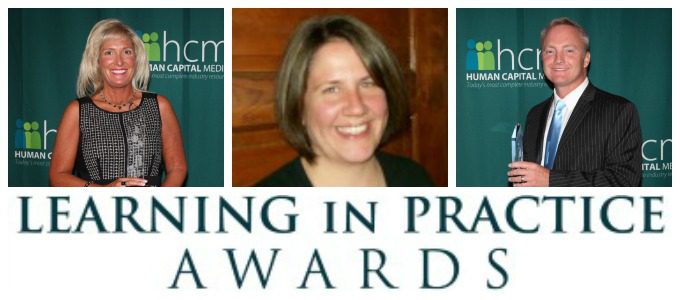
by Sarah Sipek
November 17, 2014
From left: Andrea McMullen, Laura Hilbert-Trice and Scott Bailey
Gold
Andrea McMullen
Head of Global Learning and Development, Thermo Fisher Scientific Inc.
Thermo Fisher Scientific Inc. is a leader in the biosciences industry. Its products and solutions help drive its mission to make the world a cleaner, healthier and safer place. To accomplish this mission, however, the company must continue to develop its workforce’s professional skills.
This task was especially difficult given that employees need to be educated in critical global leadership skills, particularly in the global marketing area, which is responsible for more than 50,000 products with 5,000 patents across 180 countries.
Andrea McMullen, the head of global learning and development, was tasked with leading the design, development, implementation and evaluation of the company’s new learning and development program. She faced several challenges; one of the most prominent was the educational background of Thermo Fisher Scientific’s employees. Nearly 70 percent of the staff that had to be trained holds a master’s or Ph.D. degree in science. These individuals were not keen on being trained, even though they lacked the business background necessary for the company to succeed in a competitive global market.
McMullen addressed this and other issues by developing a scalable and sustainable program that facilitates the company’s short- and long-term learning needs. Employees take courses both virtually and in the classroom, including a course conducted worldwide in a 3-D global cyber-learning platform. Completion of each course earns them credit toward graduate-level accreditation. As of January, more than 100 employees graduatedwith an Integrated Marketing Certificate, while more than 800 continue to progresstoward that same goal.
Her efforts have delivered measurable results for the company. During a major merger and acquisition in 2014, 73 percent of employees reported applied learning on the job led to results-based business outcomes.
Silver
Scott Bailey
Chief Academic Officer, Washoe County School District
Today, budget deficits seem synonymous with school districts. Providing quality education with fewer resources is a challenging task for teachers. The continued implementation of Common Core State Standards isn’t making it any easier. That’s why the Washoe County School District in Reno, Nevada, decided it didn’t need to add competition to the mix.
Instead of using government funding to build silos to support unrelated professional development areas, the $1.7 million it was awarded was repurposed to address multiple departments and offices’ needs.
Scott Bailey supervised the creation of Washoe County’s signature learning model, Core Task Project (CTP), a teacher-led effort that encourages the sharing of knowledge to make the school better as a whole. The program is built on three pillars. First, teachers continually plan lessons designed to address new standards and assessment techniques. These lessons are then test-run in classrooms; knowledge sharing takes place when teachers meet to debrief on what worked and what didn’t. Finally, the beneficial elements are adopted into the curriculum.
The program was launched with a handful of teachers and has now expanded to 2,000 teachers in the county area. Success has been recognized nationwide as well. Currently, more than 50,000 teachers share resources in accordance with CTP principles.
Bronze
Laura Hilbert-Trice
Director of Learning Programs, American Cancer Society
The American Cancer Society needed its managers to be better. The company was experiencing a high turnover — 36 percent in the past five years — and exit interviews pointed to poor management relationships.
Internal reviews revealed the organization was promoting the wrong people: strong individual contributors who lacked the ability to mold others. The organization determined the solution was to let the best leaders identify themselves.
The Nationwide Manager Development Program empowers self-identified leaders to recognize their own learning needs and select program content to fill their own knowledge gaps, create their own systems of accountability and manage their own learning experience. With no travel or face-to-face work, 80 percent of participants completed the 15-month program with the majority taking upper-management roles.



